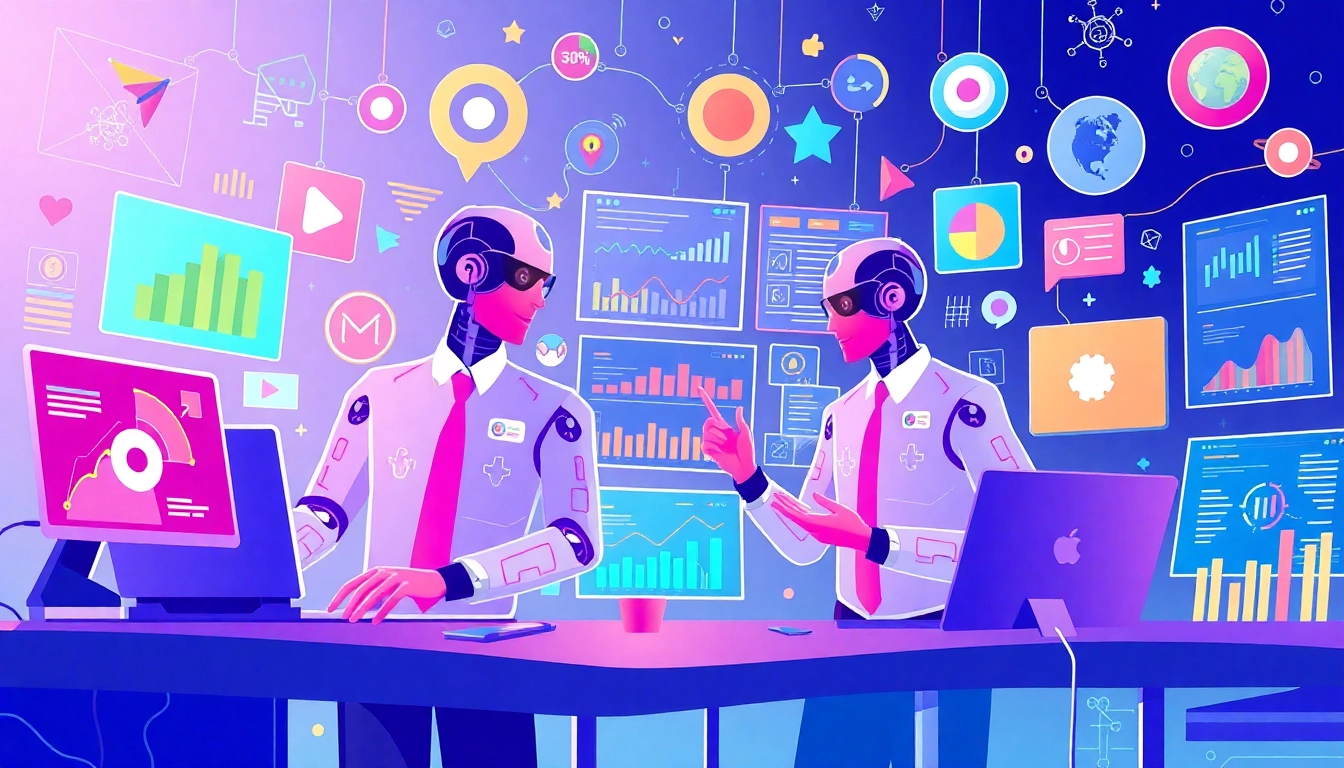Understanding AI Marketing Agents
The landscape of digital marketing is evolving rapidly, with artificial intelligence (AI) at the forefront of this transformation. Companies are leveraging AI marketing agents to optimize their marketing strategies, automate routine tasks, and derive actionable insights from data. But what exactly are AI marketing agents, and how do they operate within modern businesses?
Definition and Role of AI Marketing Agents
AI marketing agents are advanced software tools designed to automate marketing tasks using artificial intelligence technologies. They function autonomously to perform various marketing activities such as customer segmentation, campaign management, and performance analysis, thereby enhancing efficiency and productivity. In a world where personalized marketing experiences are increasingly expected, these agents play a crucial role by enabling businesses to tailor their messaging and strategies to specific audience segments with precision.
How AI Marketing Agents Operate
AI marketing agents operate through sophisticated algorithms and machine learning models that analyze vast amounts of data. Their capabilities include:
- Data Analysis: AI agents assess customer data to identify trends, preferences, and behaviors, which can then inform marketing strategies.
- Personalization: They tailor marketing messages and campaigns based on individual customer profiles, creating a more engaging experience.
- Predictive Modeling: By leveraging historical data, AI agents can predict future customer actions, helping marketers make proactive decisions.
- Task Automation: Routine tasks like social media posting, email marketing, and ad placement can be automated, saving time and resources.
This holistic approach allows businesses to focus on strategic decision-making rather than getting bogged down in repetitive tasks.
Key Benefits for Marketers
Incorporating AI marketing agents into marketing strategies offers numerous benefits:
- Increased Efficiency: Automation of repetitive tasks frees up human resources for creative and strategic work.
- Enhanced Targeting: AI enables hyper-targeted marketing campaigns through improved audience segmentation.
- Data-Driven Insights: AI agents provide real-time analytics, allowing marketers to adapt strategies on the fly.
- Cost Reduction: By automating tasks and optimizing marketing spend, businesses can effectively lower their marketing costs.
Types of AI Marketing Agents
AI marketing agents can generally be categorized into two main types, each serving distinct purposes within marketing strategies.
Software Tools for Task Automation
These AI marketing agents are dedicated software applications that handle specific tasks autonomously. They can include:
- Email Marketing Automation: Tools like Mailchimp and HubSpot can run campaigns, segment lists, and analyze performance metrics without manual input.
- Chatbots: AI-powered chatbots provide instant customer service and engagement, addressing customer inquiries 24/7 and capturing leads.
- Social Media Management: Applications like Buffer and Hootsuite facilitate scheduling, post optimization, and analytics to streamline social media campaigns.
These tools enable marketers to execute their campaigns more efficiently while ensuring effective customer communication and engagement.
Human-AI Collaborative Agencies
Another growing trend is the emergence of AI marketing agencies that blend human expertise with AI capabilities. These agencies leverage AI tools, along with human creativity and insights, to deliver comprehensive marketing services. Such agencies can:
- Develop Integrated Campaigns: By combining creative strategies with data analysis, these agencies formulate marketing campaigns that are both effective and targeted.
- Provide Strategic Consulting: Experts can interpret data insights generated by AI to create strategies that align with business goals.
- Enhance Content Marketing: Human-AI collaborations can lead to the creation of highly personalized and compelling content that resonates with audiences.
Popular AI Tools and Technologies
Several AI tools and technologies have gained traction within the marketing realm. Here are some noteworthy examples:
- Google Analytics: Uses machine learning to provide insights into user behavior and engagement on websites.
- Salesforce AI: Integrates predictive analytics to enhance customer relationship management and sales processes.
- HubSpot AI Tools: Automates inbound marketing practices, optimizing everything from email campaigns to social media interactions.
These technologies empower marketers with unparalleled insights and capabilities, driving higher efficiency in their marketing efforts.
Implementing AI Marketing Agents
Adopting AI marketing agents within your organization requires a strategic approach to maximize their utility and integration.
Steps to Integrate AI in Your Marketing Strategy
Integrating AI into your marketing strategy involves several critical steps:
- Define Objectives: Identify specific marketing goals you want to achieve through AI.
- Evaluate Existing Processes: Analyze your current marketing workflows to identify which areas can benefit most from AI.
- Select Appropriate Tools: Research and choose AI tools that align with your needs and objectives.
- Train Your Team: Ensure your marketing team is well-versed in using AI tools and understands their capabilities.
- Test and Optimize: Implement AI tools gradually, testing their effectiveness and making adjustments as needed based on performance metrics.
Best Practices for Maximizing ROI
To achieve the best return on investment (ROI) from AI marketing agents, consider these best practices:
- Continuous Learning: Stay updated on AI advancements and adapt your strategies as new opportunities and technologies emerge.
- Customer Focus: Center your AI implementations around enhancing customer experiences and engagement.
- Data Integrity: Ensure the data used to inform AI tools is accurate, reliable, and secure.
- Regular Review: Periodically assess the performance of AI initiatives and adjust your strategies accordingly.
Overcoming Common Implementation Challenges
Despite the benefits, businesses may face challenges when implementing AI marketing agents:
- Lack of Expertise: Training programs and hiring knowledgeable staff are essential to address skill gaps.
- Integration Issues: Ensure seamless integration with existing systems by working closely with IT and choosing compatible technologies.
- Change Resistance: Foster a culture that values innovation and is open to adopting new technologies through effective leadership.
- Budget Constraints: Start with smaller projects or pilot programs and gradually scale as ROI becomes evident.
Performance Measurement
Measuring the success of AI marketing agents is crucial for determining their impact and refining strategies.
Key Metrics to Track Success
To evaluate the impact of AI marketing agents, track the following metrics:
- Conversion Rates: Measure the effectiveness of campaigns by analyzing the percentage of leads converted into customers.
- Customer Engagement: Assess how interactive and responsive customers are to your campaigns.
- Return on Investment (ROI): Quantify the financial benefits gained from AI initiatives against the costs involved.
- Customer Satisfaction Scores: Use surveys and feedback to gauge audience perceptions of your marketing efforts.
Case Studies of Effective AI Marketing Use
Here are examples illustrating how businesses successfully implemented AI marketing agents:
- Coca-Cola: Leveraged AI to personalize marketing messages, resulting in increased engagement through targeted campaigns.
- Netflix: Uses sophisticated algorithms to analyze viewing habits and recommend personalized content, driving significant subscriber engagement.
- Spotify: Implements AI-driven playlists, analyzing user preferences and behaviors to improve user satisfaction and retention.
Tools for Performance Analysis
To effectively measure and analyze performance, utilize tools like:
- Google Analytics: Offers comprehensive analytics for tracking web traffic and user behavior.
- HubSpot Analytics: Integrates various data sources to provide a cohesive view of marketing performance.
- Klipfolio: Enables real-time data visualization for tracking KPIs and performance metrics.
The Future of Marketing with AI
As we look toward the future, AI marketing agents are poised to transform the marketing landscape in unprecedented ways.
Emerging Trends in AI Marketing
Several trends are expected to shape the future of AI marketing:
- Increased Personalization: AI will enable hyper-personalized customer experiences, tailoring interactions to individual preferences.
- Greater Automation: The scope of tasks that can be automated will expand, leading to even more streamlined processes.
- Voice Search Optimization: As voice-activated devices become more popular, AI will drive new strategies for SEO and digital marketing.
- Ethical AI Use: Businesses will need to navigate the ethical implications of AI usage, focusing on data privacy and transparency.
Predictions for the Next 5 Years
Within the next five years, it’s anticipated that:
- AI technologies will become essential for competitive advantage in marketing.
- The amount of data generated will increase exponentially, necessitating advanced AI solutions for analysis.
- The integration of AI with emerging technologies like augmented reality (AR) and virtual reality (VR) will redefine customer experiences.
- Regulatory frameworks around AI and data usage will evolve, impacting how businesses operate.
Preparing Your Business for AI Adoption
To prepare for this AI-driven future, businesses should:
- Invest in Training: Ensure your workforce is equipped with the necessary skills to adapt to AI tools and technologies.
- Develop a Strategic Roadmap: Create a clear plan for integrating AI into marketing processes and anticipate future developments.
- Foster a Culture of Innovation: Encourage creative thinking and adaptability within your organization.
- Monitor AI Trends: Stay informed about technological advancements and shifting regulations that will impact the marketing landscape.
In conclusion, AI marketing agents represent a significant evolution in the digital marketing realm, offering both challenges and opportunities. As businesses navigate this transition, understanding the fundamental aspects, implementation strategies, and future trends will be paramount to leveraging AI effectively and driving marketing success.



